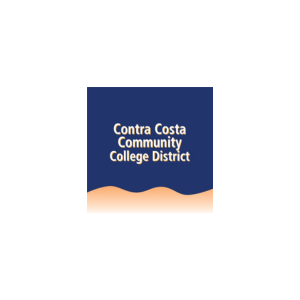
Kat King
Instructional Technologist at 4CD’s Diablo Valley College

Maritez Apigo
English Professor, Distance Education Coordinator, and Open Educational Resources Coordinator at 4CD’s Contra Costa College

Brandon Marshall
English Professor at 4CD’s Contra Costa College
Opening the door to a better future for a diverse community of learners
By providing affordable, high-quality education, 2-year colleges like those in the Contra Costa Community College District (4CD) play an important role in creating a more equitable society.
“People come to us at all different stages of their lives, and we meet them where they are,” says Kat King, instructional technologist at 4CD’s Diablo Valley College.
Contra Costa Community College District
Bay Area, California
Public, 2-year district with 45,000 students across 5 campuses
Diverse student population: 41% Hispanic/Latinx, 14% Asian, 10% Black, 17% other
Helping students improve their lives by building the reading skills they need
Like most colleges and universities, 4CD’s faculty and administrators struggled to engage students with course reading. “It’s what we all were talking about,” says King.
When students arrive at college with a wide-range of preparation, as they do at 4CD, supporting this engagement is particularly challenging.
Additionally, 4CD serves many students with learning disabilities, which may make reading especially challenging or time-consuming. “Students with dyslexia often feel like they’re not supposed to be in college. But you can learn strategies to thrive as a reader and in the workplace,” King says.
“The sad truth is that students with learning disabilities haven’t always been appropriately supported in academic settings – and that has profound consequences, like a disproportionately high percentage of people with disabilities in prisons,” says King. “Our faculty wanted tools to help all students feel welcomed and supported in the classroom. This is critical to the equity work so fundamental to community colleges.”
Creating inclusive, engaged learning communities with Hypothesis
When searching for a solution, the 4CD team prioritized finding a tool that provided insights into student engagement and progress. “We wanted to learn whether students were doing the reading, and if they weren’t, we needed to understand why they weren’t doing it,” says King.
The team also wished to find a tool that would increase instructor-student interactions and enable faculty to provide just-in-time feedback to students. “We wanted to be able to reach them at home, while they might be struggling with a text,” King adds.
Enabling faculty to build students’ confidence and skills
4CD implemented Hypothesis across a range of humanities courses, including a first-year composition course with a high percentage of ESL students. “I have a lot of ‘1.5 generation’ students who are still developing their English language skills,” says Maritez Apigo, English Professor, Distance Education Coordinator, and Open Educational Resources Coordinator at 4CD’s Contra Costa College.
For Apigo, Hypothesis offered a new way to teach the six comprehension strategies that have stood at the center of her pedagogy for decades. “As students are reading, I ask them to tag the strategies they’re using in the margins,” says Apigo, who also encourages students to flag parts of the text that illustrate key concepts. “When it’s time to write an essay, they can choose a quote they’ve already selected.”
4CD faculty noticed its impact — particularly in encouraging students to engage with course reading. “With Hypothesis, there are no right or wrong answers. I can empower students to challenge ideas and express their own point of view,” says Brandon Marshall, English Professor at 4CD’s Contra Costa College.
They also praised Hypothesis for its ability to help students develop as thinkers. “As English faculty, our goal isn’t just to develop students’ reading and writing skills — it’s to help them become better critical thinkers,” says Apigo. “Hypothesis helps us encourage students to have a metacognitive conversation about what they’re reading,” says Apigo.
Building a fanbase of students and faculty
In the eyes of the 4CD team, one of its major keys to success with Hypothesis is that its usage spread organically among faculty and students — a rarity in higher education, where most technology usage is driven from the top down.
“Students love Hypothesis because it hits the sweet spot between innovation and familiarity,” says Kat King. “Because students actually enjoy using Hypothesis, our faculty has bought in, so much so that they’ve begun convincing their colleagues at other colleges to implement it.”
Empowering diverse groups of students to engage with course content
After having made 366,311 annotations as of May 2023, 4CD’s students were clear about the impact Hypothesis made on their learning experience. According to a survey of 103 students:
72% of students said that Hypothesis helped them think critically about the reading.
68% identified responding to their peers as their favorite feature.
In the eyes of the 4CD team, students took to Hypothesis because it showed them just how much they can bring to the classroom.
“I jump in once in a while to steer the conversation, but Hypothesis keeps the discussion centered around them — and encourages them to support each other,” says Apigo. “Our students have so much to offer; Hypothesis helps us empower them to take things further.”
Ready to engage your institution’s diverse population of learners?
Visit web.hypothes.is or email education@hypothes.is to schedule a brief demo.
About Hypothesis
Hypothesis is a new effort to implement an old idea: A conversation layer over the entire web that works everywhere. The Hypothesis social annotation tool is used by over a million people around the world who have made over 45 million annotations. In higher education, more than 400 colleges and universities use Hypothesis.
Ready to give students a whole new way to engage with scholarly content? Fill out the form below to get started:
